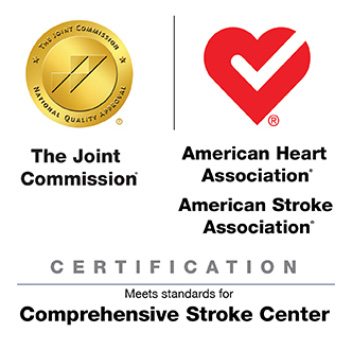
Our Stroke Certifications
Tower Health hospital advanced stroke centers are Joint Commission-certified, demonstrating our efforts and commitment to achieving the highest standards of performance and care. Learn more about our Stroke Care Awards and Accreditations.
Accredited Tower Health Hospitals
We provide life-saving treatment for complex stroke patients, including access to innovative endovascular treatments, to stop or reverse the long-term effects of a stroke.
How Reading Hospital Achieved CSC Designation
- Program leadership. Our team is led by medical directors with extensive cerebrovascular expertise.
- 24/7 stroke rapid response team. Our best-in-class, onsite team of vascular neurologists and emergency physicians work together to identify stroke symptoms and quickly initiate treatment.
- Advanced imaging capabilities. Reading Hospital offers 24/7 imaging for stroke care, including computed tomography, computed tomography angiography, computed tomography perfusion, cerebral angiography, and stroke magnetic resonance imaging. We also perform cranial and cardiac ultrasounds, when needed.
- Neuroradiologists. Specialists provide expert interpretation of advanced brain imaging and timely communication to our vascular neurologists to assist with emergent treatment decisions.
- Neurointerventionalists. Using minimally invasive techniques, our 24/7 team quickly removes blood clots from brain vessels and restores blood flow to preserve brain tissue.
- Vascular neurosurgeons. Specializing in treating blood vessel abnormalities of the brain, such as an aneurysm (a bulging in an artery), this team of subspecialized neurosurgeons performs precise procedures to clip or coil the aneurysm to reduce the risk of further bleeding.
- Vascular surgeons. Specializing in treating carotid stenosis with surgical procedures, stenting, and trans-carotid stenting (TCAR).
- Dedicated neuro-intensive care unit. A 24/7, neuro-specialized intensivist service providing advanced multimodality monitoring.
- Neurointensivists. Our experts specialize in acute brain disorders and treat life-threatening medical complications that are impacted by a stroke. These complications can involve the heart, lungs, and kidneys.
- Dedicated stroke unit. Our inpatient stroke unit brings together hospitalists, cardiologists, physical and occupational therapists, speech therapists, specialty trained nurses, and other care providers with experience in stroke care.
- Extensive collaboration with regional first responders. We work with local paramedics and emergency medical technicians to facilitate quick recognition and triage.
- Active in stroke research. We study the effects and care of stroke to help improve outcomes.
- Rigorous data collection, peer review, and performance improvement initiatives.

Phoenixville Hospital
Primary Stroke Center

Pottstown Hospital
Primary Stroke Center
Pottstown and Phoenixville Hospitals are certified as Primary Stroke Centers (PSC), signifying our commitment to delivering standardized care centered on evidence-based guidelines.
Our PSCs provide rapid, specialized neurological evaluations when stroke is suspected. They have the 24/7 ability to treat ischemic (blocked blood vessel) stroke with life-saving "clot-busting" medication, and admit patients to dedicated stroke beds.
How Pottstown and Phoenixville Hospitals Achieved PSC Designation
- Medical Director with experience in cerebrovascular disease
- Acute stroke team available 24/7 and at the bedside within 15 minutes
- Designate stroke unit or designated beds for the care of acute stroke patients
- Emergency department collaboration with the initial assessment
- Advanced imaging available 24/7, and cardiac imaging when appropriate
- 24/7 vascular neurology expertise in person or through telemedicine
- Neurosurgical services within two hours of consultation
- Operating rooms available 24/7
- Collaboration with EMS and community outreach

